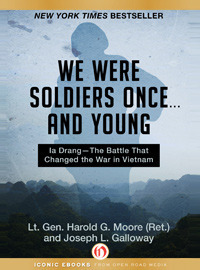Susan Howatch's Blog, page 3
February 4, 2013
Military Monday: Behind-the-scenes with author Michael Stokey
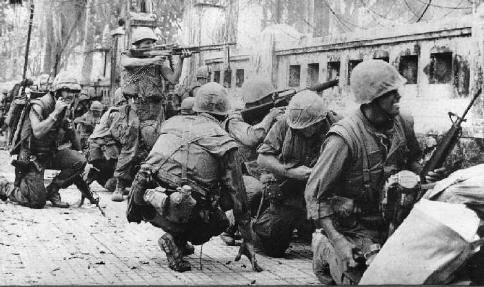 Last Thursday, January 30, marked the 45th Anniversary of the Tet Offensive, launched in 1968. Though a prior agreement between North and South Vietnam had been reached for a temporary "cease-fire" during the Tet Lunar New Year celebrations, the Communists launched a series of surprise attacks on South Vietnam, the United States, and their allies beginning in the early mornings hours of January 30th, the first day of Tet. This offensive would prove to be the largest military operation, conducted by either side, up to that point.
Last Thursday, January 30, marked the 45th Anniversary of the Tet Offensive, launched in 1968. Though a prior agreement between North and South Vietnam had been reached for a temporary "cease-fire" during the Tet Lunar New Year celebrations, the Communists launched a series of surprise attacks on South Vietnam, the United States, and their allies beginning in the early mornings hours of January 30th, the first day of Tet. This offensive would prove to be the largest military operation, conducted by either side, up to that point.
Back in the states, the U.S. was immersed in the Age of Aquarius, the civil rights movement, and the mini skirt—but for those in the jungle and rice paddies of Southeast Asia during the Battle for Hue, Tet 1968, life was completely different.
Michael Stokey's novel, River of Perfumes, full of innocence, adolescent passion and coming of age horror, captures the contradictions of the times —and examines what the brutality of war does to young men in battle.
We caught up with Stokey and asked him to share his back-story on the writing River of Perfumes.
 I never planned to write anything about the Nam. Started some finger exercises on it in 1969, when I was trying to get work as an actor in New York City. The acting came, and I shelved the writing, but sent all the scribblings back to L.A. where I returned the following year, and never paid to retrieve the COD foot locker from the post office. Nevertheless, I always wrote, usually about other things in the intervening years. Did I say years? Decades. And so it goes with the great line John Lennon co-opted: "Life is what happens while you're busy making other plans."
I never planned to write anything about the Nam. Started some finger exercises on it in 1969, when I was trying to get work as an actor in New York City. The acting came, and I shelved the writing, but sent all the scribblings back to L.A. where I returned the following year, and never paid to retrieve the COD foot locker from the post office. Nevertheless, I always wrote, usually about other things in the intervening years. Did I say years? Decades. And so it goes with the great line John Lennon co-opted: "Life is what happens while you're busy making other plans."
In 1984, I took up the idea of River of Perfumes again, this time as a screenplay, which was optioned a year before PLATOON came out. The screenplay never got produced and a few years later I wrote the novel which was optioned by Avon books, but never published. I lost interest for another 15 years, becoming part of Captain Dale Dye's military advisory team, as well as helping to create other ideas and series bibles for television with Dye.
Finally, Dale and Julia Dye prodded me to revisit and revise the novel again. Although historical fiction, I had lived part of it, and had expended my passion in the writing. At least until I came up with the device of a back story that re-started the book before Vietnam. My interest in telling where these young protagonists came from in the fields and open roads of the Fifties and early Sixties renewed my passion. That section of the book is still among my favorites.
February 1, 2013
Low-Maintenance Super Bowl Snacks
So what do you do when you’ve got a house full of hungry sports fanatics? Finish cooking before you even don your jersey with help from the Fix-It and Forget-It collection of e-cookbooks. They’ll help you use your slow cooker to make crowd-pleasing favorites far ahead of time.
With hearty fare such as Chicken Enchiladas and Cheesy Spinach and Bacon Dip, Phyllis Pellman Good’s recipes will fill up any crowd, so you can have a perfect Super Bowl Sunday without missing a second of the action.
Check out sample recipes from Fix-It and Forget-It Holiday Appetizers, Finger Foods, and Beverages and Fix-It and Forget-It 5-Ingredient One-Dish Dinners.
Fix-It and Forget-It Holiday Appetizers, Finger Foods, and Beverages by Phyllis Pellman Good [Excerpt] by OpenRoadMedia
Fix-It and Forget-It 5-Ingredient One-Dish Dinners by Phyllis Pellman Good [Excerpt} by OpenRoadMedia
January 30, 2013
Thoughts on women in combat
One week ago today, it was reported that, at the recommendation of the Joint Chiefs of Staff, the ban on women serving in combat would be formally lifted. As would be expected, reaction to the news was mixed with authorities on both sides weighing in. We work with a number of combat-veteran authors and esteemed military experts here at Open Road Media—and we were curious to hear their thoughts on the matter. Turns out, they were mixed, as well. Herewith, some quick takes on the subject from a handful of our seasoned authors.
Defense Secretary Leon Panetta's decision to lift the official ban on women serving in combat is long overdue, since American women have been serving in combat since the beginning of the Iraq War in 2003. Scores of women have given their lives in combat; hundreds have been wounded or injured; thousands have pulled tours every bit as dangerous as the ones men serve.
Secretary Panetta's action recognizes the reality on the ground in Iraq and now in Afghanistan, but it will open up several combat occupation specialties to women, as deserved, and clear career paths to easier promotion to high ranks. Most important, this decision levels the playing field so that women who meet both physical requirements and training standards have the same opportunities as anyone else wearing our country's uniforms.
I could name half a dozen military women I have met in recent years who not only meet but exceed those standards, and I would be proud to share a foxhole or bunker with them in any combat zone. West Point and Annapolis and the Air Force and Coast Guard academies turn out a wonderful annual crop of ever-stronger, ever-better women officers.
Those among them who choose a combat MOS (military occupational specialty) and meet the standards have earned the opportunity to serve and be fully recognized for that service. Bravo!
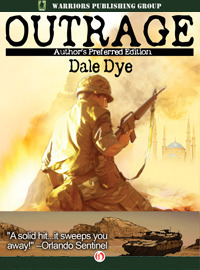 From Captain Dale Dye, author of Outrage, the award-winning "File Series" and more:
From Captain Dale Dye, author of Outrage, the award-winning "File Series" and more:
As a two-decade veteran in both peace and war who has both commanded women in uniform and been commanded by them, I’ve got a dog in the hunt here, but my concerns go beyond the superficial elements of physical demands or qualifications. Amid all the furor and breast-beating—no pun intended—over the opening of direct infantry combat roles to American women, larger issues are at stake when we use our military services as lab rats for social experiments.
People who enter military service ultimately are products of the society they volunteered to defend. It’s that society that concerns me, and I ask myself disturbing questions like these: What sort of man sends women off to kill things and break stuff—the ultimate bottom line mission of our military? What kind of society tolerates that when it is not facing a shortage of qualified males to do the heavy lifting? And what sort of society says on the one hand women are disrespected and can’t recognize on the other hand that respect is predicated on the very specialness of women?
Traditions in the American military and civilian society are damaged if not broken entirely where women are placed in direct combat roles. If that makes me a curmudgeon, so be it. Part of my very maleness is a desire to defend my mother, wife, sister and other females who are an important part of what makes my country great. Defending them means keeping them out of harm’s way through my own service and sacrifice.
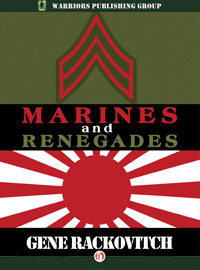 Gene Rackovitch, author of Marines and Renegades, weighs in on women in combat:
Gene Rackovitch, author of Marines and Renegades, weighs in on women in combat:
If they can sleep together and train together they can fight together—and that’s not going to happen. One of the generals signing the edict said harassment and rape would not happen if women were given combat roles, and that is insane. First, the male soldier carries immunity to justice in relation to women. Ask any women soldier even approached for sexual favors how far they got when the incident was reported, and they will tell you they were the judged—not the offender. My granddaughter was in Iraq for two tours. She was approached by an officer for sexual favors, and reported it to her first sergeant. He told her not to report it and he would take care of it, and that’s where it ended. He knew that if he took any action on the incident, it would require her to be questioned, and in the long run she would be chastised as though she had made the proposal.
To put women in harm’s way while on patrol puts the male soldier carrying American ethics in an untenable position. We say that men must protect women at all costs; how then does he justify that under adverse conditions, which in all probability could put the operation in jeopardy? I know the Marine Corps will likely adhere to the decision passed down to them, but will subvert it to Marine Corps standards. Everyone has their place on this earth—but women should not go into combat units.
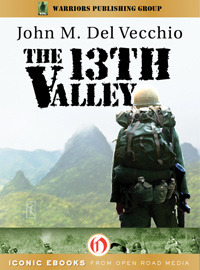 John Del Vecchio, author of several critically acclaimed novels including The 13th Valley notes:
John Del Vecchio, author of several critically acclaimed novels including The 13th Valley notes:
There is a right way and a wrong way to do most anything; and there are systems of thought and pre-established formats on which to project likely ramifications, as well as criteria against which those ramifications ought to be gauged.
The prime mission of our military is national defense; the foremost criteria for this decision must be the effectiveness of our armed forces. Two nations with women in combat roles immediately come to me: Israel and Cambodia. Military service is mandatory for Israeli women, and 90% of all slots, including ground combat slots, are open to women. Female IDF troops are recognized as amongst the best soldiers in the world; yet understand 10% of slots are restricted to those with greater strength, endurance and speed. In Cambodia in the 1970s the efficiency of Pol Pot’s battalions of neary became legendary. These very capable women soldiers were feared for their aggression, brutality and slaughter--though one might point out their ‘enemies,’ at times, were unarmed civilians. Women are quite capable of atrocities. Another factor: Where speed and strength are required, it might be wise to remind the social engineers in the Pentagon that hundreds of high school boys have run the 100-meter dash faster than Florence Griffith-Joyner’s 1988 Women’s World Record. At the tip of the spear speed is a component of combat effectiveness—and enemy commanders may fill their ranks with boys.
Both U. S. Defense Secretary Leon Panetta and I served our country during the Vietnam War era, when the incongruity of our perspectives about, and treatment of, women could not have been more glaring. During that time, women were seeking more equality at home, and this was increasingly obvious to me, a soldier who both stateside and in Vietnam was under the command of Women’s Army Corps (WAC) officers. True, their jobs in Army information were presumed to be safe and “behind the lines,” but the reality in Vietnam’s guerilla war was that the non-combat distinction was often meaningless. Like Iraq and Afghanistan, there were no front lines in Vietnam, and that knowledge may have helped better prepare our soldiers for what they would encounter in these recent guerilla wars.
Ironically, our combatants at that time – the North Vietnamese and Viet Cong – employed strong, fierce women as fighters. They were equal to the men and helped win the war. But regardless of gender, or nation, combat soldiers lives are never again “normal.” And now that’s a burden both genders will share. Who benefits from that is a question to ask sooner rather than later.
I am a pragmatist. If men and women have the same possible physical capabilities—both have to pass the same qualifications, for example—they still are different, or we wouldn't have segregated sports teams. Some women Olympians have even had to take 'gender' tests to prove they were women when they performed above expectation. We still don't allow women to compete directly against men in nearly all sports. But why would this be if a woman could compete equally with men? Sports exist to win games. If having a woman on a team would make winning easier, teams and individuals would be clamoring for the rules to change. They're not.
I think we take professional football more seriously than we do our national defense.
All things cannot be all equal. Basketball discriminates against short people. There are height and weight limits both in the military in general and for specific specialties. We acknowledge that people are different and have differing abilities.
I have sympathy for career military women who do have a harder path to promotion without combat experience. I do not, however, believe the military exists as a career program for anyone. Military assignments should serve the mission of the military and the country...not the satisfaction of the individual service members.
We'd like to hear from you. Do you agree with formally lifting the ban on women in combat?
Excerpt of the Week: From Ending by Hilma Wolitzer
I suppose every married couple has something, a certain rhythm to the conversation, a settling of two bodies in the space of the bed. I imagined this happening everywhere, in apartments across the city, shoes dropping, droning synopses of the day’s events. Complaints whispered, kisses, covers flung back, children calling out revelations in their sleep. — Ending , Hilma Wolitzer
At night, Sandy feels the pain of separation most deeply. As she settles into bed, she misses the sounds Jay used to make as he emptied his pockets and undressed. She misses the way a playful nighttime conversation could become significant in an instant. She misses his touch. To fall asleep, she imagines Jay’s voice, imagines their loving exchanges—but she cannot imagine lying in his arms.
Read the entire featured excerpt from Ending by Hilma Wolitzer, below.
Ending by Hilma Wolitzer {Excerpt} by OpenRoadMedia
We're proud to have just released Ending and several other titles by Wolitzer, in ebook. Learn more about this critically hailed author and her work, here.
John Jakes Meets Mad Max
 John Jakes, a bestselling historical novelist, is known for his American battleground sagas, and praised for his period accuracy in epics such as the North and South Trilogy and the Kent Family Chronicles. It’s not all roaring cannons and swooning women, though. Not many readers would guess that Jakes also wrote the Brak the Barbarian adventures, starring a loincloth-wearing, monster-fighting he-man. Fewer still might know about Jakes’s literary visions of an apocalyptic future reminiscent of the 1979 film Mad Max.
John Jakes, a bestselling historical novelist, is known for his American battleground sagas, and praised for his period accuracy in epics such as the North and South Trilogy and the Kent Family Chronicles. It’s not all roaring cannons and swooning women, though. Not many readers would guess that Jakes also wrote the Brak the Barbarian adventures, starring a loincloth-wearing, monster-fighting he-man. Fewer still might know about Jakes’s literary visions of an apocalyptic future reminiscent of the 1979 film Mad Max.
For today’s Fantasy Wednesday, we reveal the Jakes who set aside historical accuracy and cut loose in science fiction and sword-and-sorcery style.
Jakes began writing his Brak the Barbarian stories in the late 1960s. “I created Brak for the fantasy magazines because there wasn’t enough Conan [the Barbarian] to go around,” Jakes mentioned in his interview with Open Road. Brak the Barbarian went up against evil wizards and heinous monsters. For those of you looking for fast-paced adventures with plenty of laughs along the way, these are perfect books for you.
On Wheels and Six-Gun Planet are Jakes’s futuristic novellas. On Wheels has the most Mad Max appeal: In this story, the United States has become so overpopulated that ten percent of the population is homeless. These displaced people spend their lives on the dangerous highways, where roving clans of road warriors have fierce turf wars over control of the roads. Everyone must be constantly in motion, going at least forty miles per hour—so brace yourself for fiery car crashes and exciting chases.

Six-Gun Planet, meanwhile, is part Western and part science fiction, taking place in a future that imitates the past. On the isolated, violent planet of Missouri, the ruling revolutionaries decide to mimic the Wild West of 1880. The cowboys, however, ride robot horses, and the planet’s primary export is Western-themed memorabilia. Zak, a newcomer to Missouri, despises its Wild West pretense. But when Zak is challenged to a duel by the infamous gunslinger Buffalo Yung, Zak must draw his gun.
For more information on John Jakes, view his author page here, which features his complete title list as well as two mini-documentaries, filmed at his home in Florida.
January 29, 2013
Award-Winning Children’s Authors
The prestigious Newbery and Caldecott awards have been called the Oscars of the children’s literary world. The Newbery Medal is awarded to the author of the most distinguished contribution to American literature for children, while runners-up receive the Newbery Honor. The Caldecott Medal honors the artist of the most distinguished American picture book. The American Library Association recently announced the 2013 award winners and honorees. To celebrate, we salute Open Road authors and illustrators whose work has received recognition.
Newbery Medalists
 In 1975, Virginia Hamilton became the first African American woman to win a Newbery Medal, when her novel M.C. Higgins the Great received the top honor. Hamilton also received Newbery Honors for The Planet of Junior Brown; Sweet Whispers, Brother Rush; and In the Beginning: Creation Stories from Around the World in 1972, 1983, and 1989, respectively.
In 1975, Virginia Hamilton became the first African American woman to win a Newbery Medal, when her novel M.C. Higgins the Great received the top honor. Hamilton also received Newbery Honors for The Planet of Junior Brown; Sweet Whispers, Brother Rush; and In the Beginning: Creation Stories from Around the World in 1972, 1983, and 1989, respectively.
 Jean Craighead George received the Newbery Medal in 1973 for Julie of the Wolves.
Jean Craighead George received the Newbery Medal in 1973 for Julie of the Wolves.

Lois Lenski won the Newbery Medal in 1946 for Strawberry Girl. Four years earlier, she scored a Newbery Honor for Indian Captive.

Betsy Byars won the Newbery Medal for Summer of the Swans in 1971. Byars also received the National Book Award for The Night Swimmers in 1983.
Newbery Honor Winners

In 1990, Janet Taylor Lisle received the Newbery Honor for her novel Afternoon of the Elves.
 Richard and Florence Atwater’s Mr. Popper’s Penguins received the Newbery Honor in 1939.
Richard and Florence Atwater’s Mr. Popper’s Penguins received the Newbery Honor in 1939.

In 1975, Bette Greene received the honor for her novel Philip Hall Likes Me. I Reckon Maybe.
Caldecott Medalist
Chris Raschka first won the Caldecott in 2006 for Hello, Goodbye Window. His picture book, A Ball for Daisy, also won in 2012. In 1994, he received the Caldecott Honor for Yo! Yes?
In this video, Open Road recognizes all of these outstanding, award-winning children’s authors.
January 28, 2013
Black History Month Celebrates Mystery Authors
February marks Black History Month, so all month long we’d like to salute several African American authors who keep our pulses racing and our pages turning with their thriller and mystery novels. Check out our top three recommendations below.

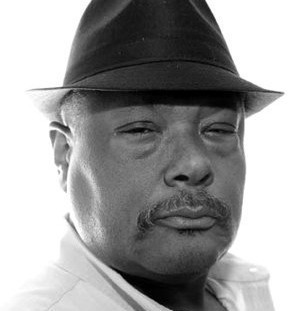 Only the Wicked by Gary Phillips. Phillips, who grew up in Los Angeles, draws on his hometown for his evocative Ivan Monk mystery series. In the final installment, private eye Monk confronts America’s shameful, racist past. One day in a barbershop, Monk is surprised to hear an elderly man mention one of Monk’s relatives. Old Man Spears had played baseball in the Negro Leagues long ago, and says they were teammates. Monk tries to learn more but suddenly both Spears and his relative die. Monk follows the trail to Mississippi, where he must confront the troubled history of his family and his country.
Only the Wicked by Gary Phillips. Phillips, who grew up in Los Angeles, draws on his hometown for his evocative Ivan Monk mystery series. In the final installment, private eye Monk confronts America’s shameful, racist past. One day in a barbershop, Monk is surprised to hear an elderly man mention one of Monk’s relatives. Old Man Spears had played baseball in the Negro Leagues long ago, and says they were teammates. Monk tries to learn more but suddenly both Spears and his relative die. Monk follows the trail to Mississippi, where he must confront the troubled history of his family and his country.
Before writing novels, Phillips worked as a community activist in Los Angeles for over twenty-five years, on issues including affordable housing, gang intervention, and neighborhood empowerment.
 Fear of the Dark by Gar Anthony Haywood. With this novel, Los Angeles native Haywood won the Shamus Award for best first novel in 1998, and introduced his tough LA detective Aaron Gunner. Gunner is hired to track down the man who murdered several members of a black activist group. He soon discovers that the killer belong to a gang of white supremacists—and their next target is Gunner himself.
Fear of the Dark by Gar Anthony Haywood. With this novel, Los Angeles native Haywood won the Shamus Award for best first novel in 1998, and introduced his tough LA detective Aaron Gunner. Gunner is hired to track down the man who murdered several members of a black activist group. He soon discovers that the killer belong to a gang of white supremacists—and their next target is Gunner himself.
Haywood’s writing has won him several awards, including the Shamus and Anthony awards. Vibe Magazine has called his work, “essential reading for those looking to widen their eyes to a multicultural reality."
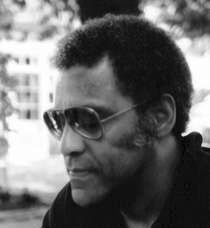 The Black Samurai by Marc Olden. In this pulp fiction classic, Olden kicks off his martial arts series starring Robert Sand, the first black man ever to take the oath of the Japanese samurai. Through eight novels, Sand goes up against all sorts of baddies, chasing terrorists, arms dealers, thieves, and kidnappers around the globe.
The Black Samurai by Marc Olden. In this pulp fiction classic, Olden kicks off his martial arts series starring Robert Sand, the first black man ever to take the oath of the Japanese samurai. Through eight novels, Sand goes up against all sorts of baddies, chasing terrorists, arms dealers, thieves, and kidnappers around the globe.
The Black Samurai was later turned into a 1977 film, starring Jim Kelly, also called Black Samurai.
***
For more information, be sure to visit Open Road's page devoted to Black History Month, featuring a selection of books and mini-documentaries honoring the legendary voices in the African American community.
Archival Photo of the Week: Ishmael Reed

In the spirit of Black History Month and in anticipation of the digital release of our Ishmael Reed ebook collection (launching tomorrow), we're pleased to feature this photograph of acclaimed authors Ishmael Reed and Toni Morrison. They're shown having breakfast at the InterContinental Mark Hopkins Hotel in San Francisco, in December 2004.
Reed is an acclaimed multifaceted writer whose work often engages with overlooked aspects of the American experience. He has published ten novels, including Flight to Canada and Mumbo Jumbo, as well as plays and collections of essays and poetry.
Reed’s prolific output is unified by an interest in African American life and its wider relationships to American society. His work at times deploys parody and biting satire, using these to dissect repressively Eurocentric narratives of history and culture, and to critique dogma of all kinds. Advocating for a fully inclusive art, and marked by stylistic variety and playfulness, Reed’s work is sometimes described as postmodern. Its humor, however, is married to a passionate candor about history and social issues.
He was nominated for a National Book Award in both poetry and prose in 1972. Conjure (1972), a volume of poetry, was nominated for a Pulitzer Prize, and his New and Collected Poems: 1964–2006 (2007) received a Gold Medal from the Commonwealth Club of California. Reed has also received a Lila Wallace–Reader’s Digest Award, a Guggenheim Fellowship, a Blues Song Writer of the Year award from the West Coast Blues Hall of Fame, a Rosenthal Family Foundation Award from the National Institute for Arts and Letters, and a MacArthur Fellowship. Reed taught at the University of California, Berkeley, for thirty-five years and currently lives in Oakland, California.
Learn more:
Visit Ishmael Reed's Author Page Watch Open Road's Mini-Documentary Video on Reed Read an Excerpt from Mumbo JumboPhoto courtesy of Tennessee Reed
January 27, 2013
Holocaust Remembrance Day
January 27 marks International Holocaust Remembrance Day, as designated by the UN General Assembly.
It is the anniversary of the liberation of Auschwitz-Birkenau. According to the United States Holocaust Memorial Museum:
On this annual day of commemoration, every member state of the UN has an obligation to honor the victims of the Nazi era and to develop educational programs to help prevent future genocides. This year’s theme is Rescue during the Holocaust: The Courage to Care.
We've collected some important works on the subject:
 Escape from Sobibor
by Richard Rahske
Escape from Sobibor
by Richard Rahske
On October 14, 1943, six hundred Jews imprisoned in Sobibor, a secret Nazi death camp in eastern Poland, revolted. They killed a dozen SS officers and guards, trampled the barbed wire fences, and raced across an open field filled with anti-tank mines. Against all odds, more than three hundred made it safely into the woods. Fifty of those men and women managed to survive the rest of the war.
In this edition of Escape from Sobibor, fully updated in 2012 and exclusively for this ebook edition, Richard Rashke tells their stories, based on his interviews with eighteen of the survivors. It vividly describes the biggest prisoner escape of World War II.
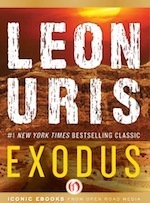 Exodus
by Leon Uris
Exodus
by Leon Uris
The Exodus was just one ship among many that carried survivors of the Holocaust to Palestine to establish a new nation. But the path that Jewish immigrants took to enter British-controlled Palestine was a difficult one, fraught with danger and political intrigue. The boat was intercepted by British forces and the refugees were placed in concentration camps.
Uris’s blockbuster novel traces the lives of the men and women who brave British naval blockades to help Israel come into being, from Ari Ben Canaan, who works tirelessly to smuggle in settlers, to Kitty Fremont, an American nurse drawn into a vast, tragic history. Weaving together fact and fiction, history and dramatic storylines, Exodus stands today as one of the most influential narratives of the founding of the State of Israel.
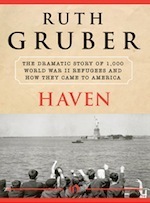 Haven
by Ruth Gruber
Haven
by Ruth Gruber
In 1943, nearly one thousand European refugees from eighteen different countries set out on a journey for asylum in the United States. Accompanying them was Ruth Gruber, who with the backing of the United States government, was made a simulated General to escort the refugees on their secret mission across the Atlantic from a port in Italy to a camp in Oswego, New York—a dangerous endeavor that carried the threat of Nazi capture with each passing day.
While on board the ship that was to transport them to America, Gruber recorded the stories of the refugees, and she presents them in vivid detail here. The result is a poignant and engrossing story of suffering under Nazi persecution and bravery in the face of the most overwhelming of circumstances.
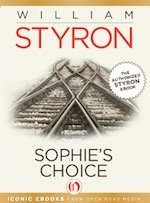 Sophie's Choice by William Styron
Sophie's Choice by William Styron
Winner of the 1980 National Book Award, Sophie’s Choice is William Styron’s classic novel of love, survival, and regret, set in Brooklyn in the wake of the Second World War. The novel centers on three characters: Stingo, a sexually frustrated aspiring novelist; Nathan, his charismatic but violent Jewish neighbor; and Sophie, an Auschwitz survivor who is Nathan’s lover. Their entanglement in one another’s lives will build to a stirring revelation of agonizing secrets that will change them forever.
Poetic in its execution, and epic in its emotional sweep, Sophie’s Choice explores the good and evil of humanity through Stingo’s burgeoning worldliness, Nathan’s volatile personality, and Sophie’s tragic past.
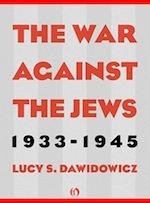 The War Against the Jews by Lucy S. Dawidowicz
The War Against the Jews by Lucy S. Dawidowicz
Lucy Dawidowicz’s groundbreaking The War Against the Jews inspired waves of both acclaim and controversy upon its release in 1975. Dawidowicz argues that genocide was, to the Nazis, as central a war goal as conquering Europe, and was made possible by a combination of political, social, and technological factors. She explores the full history of Hitler’s “Final Solution,” from the rise of anti-Semitism to the creation of Jewish ghettos to the brutal tactics of mass murder employed by the Nazis.
Written with devastating detail, The War Against the Jews is the definitive and comprehensive book on one of history’s darkest chapters.
***
Important links and websites:
- Learn about the Holocaust and the UN Outreach Program
- View a video about Auschwitz courtesy of the U.S. Holocaust Memorial Museum
- Learn about the commemoration events taking place throughout the world
January 26, 2013
The 40th Anniversary of the Paris Peace Accords
On January 23, 1973, President Richard Nixon announced an agreement had been reached which would "end the [Vietnam] War and bring peace and honor". Negotiated by Henry Kissinger, Nixon's national security advisor, and North Vietnam's Le Duc Tho, this agreement, known as The Paris Peace Accords, called for a January 27, 1973 ceasefire.
On that date, the United States, South Vietnam, Viet Cong, and North Vietnam formally signed "An Agreement Ending the War and Restoring Peace in Vietnam" the provisions of which included the aforementioned cease-fire throughout Vietnam; United States' agreement to the withdrawal of all U.S. troops and advisors from the area; and the dismantling of all U.S. bases within 60 days. In return, North Vietnam agreed to return all prisoners of war.
While the Paris Peace Accords ended America's direct involvement in the Vietnam war, it did nothing to end the war between North and South Vietnam. They resumed fighting later that year and in January 1974, President Thieu declared the accords no longer in effect. The Vietnam War would not end until April 30, 1975 when the North Vietnamese overran Saigon, forcing South Vietnam to surrender.
Today, seven months into the Commemoration of the 50th Anniversary of the Vietnam War, its effects continue to be a part of our country's daily conversation as witnessed by James Carroll's recent Boston Globe op-ed: Vietnam haunts nominations.
Explore more on the Vietnam War:
From a reporter's point of view:
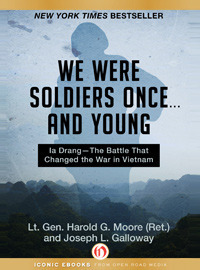 We Were Soldiers Once...And Young by Lt. Col. Harold G. Moore (Ret) and Joseph L. Galloway
We Were Soldiers Once...And Young by Lt. Col. Harold G. Moore (Ret) and Joseph L. GallowayGalloway, a news reporter and the only civilian to ever receive the Bronze Star for Valor for actions taken in Vietnam, co-authored this account of Ia Drang—the first major ground battle of the Vietnam War—with Harold G. Moore the commander of the 1st Battalion of the 7th Cavalry by way of in-depth interviews with more than 100 survivors.
Joseph Galloway on being a reporter in Vietnam and more on why journalists risk their lives in war zones.
From a doctor's point of view:
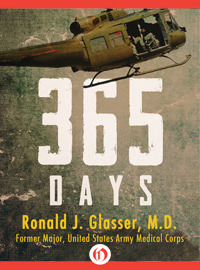 365 Days by Ronald J. Glasser, M.D.
365 Days by Ronald J. Glasser, M.D.
Hailed as a "valuable and redemptive work" by William Styron in The Washington Monthly and "a book of great emotional impact" by the New York Times, 365 Days is a harrowing and heartrending account of the Vietnam War as seen through the eyes of a pediatrician turned army doctor.
Dr. Ronald Glasser on writing 365 Days
From a patriotic soldier-turned-anti-war-advocate
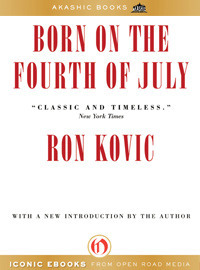 Born on the Fourth of July by Ron Kovic
Born on the Fourth of July by Ron Kovic
Oliver Stone said it best, "As relevant as ever, this book is an education. Ron is a true American and his great heart and hard-won wisdom shine through these pages."
On the fiction front:
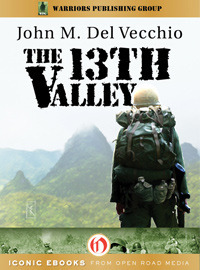 The 13th Valley by John Del Vecchio
The 13th Valley by John Del Vecchio
This classic follows the strange and terrifying Vietnam combat experiences of James Chelini, a telephone systems installer who finds himself an infantryman in territory controlled by the North Vietnamese. Considered a seminal work on the Vietnam experience, this classic traces a young man's journey from semi-pacifist to all-out warmonger.
 River of Perfumes by Michael Stokey
River of Perfumes by Michael Stokey
The U.S. was immersed in the Age of Aquarius, the civil rights movement, The Pill, and girls in short skirts and long boots—but life in the jungles and rice paddies of Southeast Asia during the 1968 Tet Offensive was very, very different. River of Perfumes brilliantly captures the contradictions of the times.
Susan Howatch's Blog
- Susan Howatch's profile
- 553 followers


